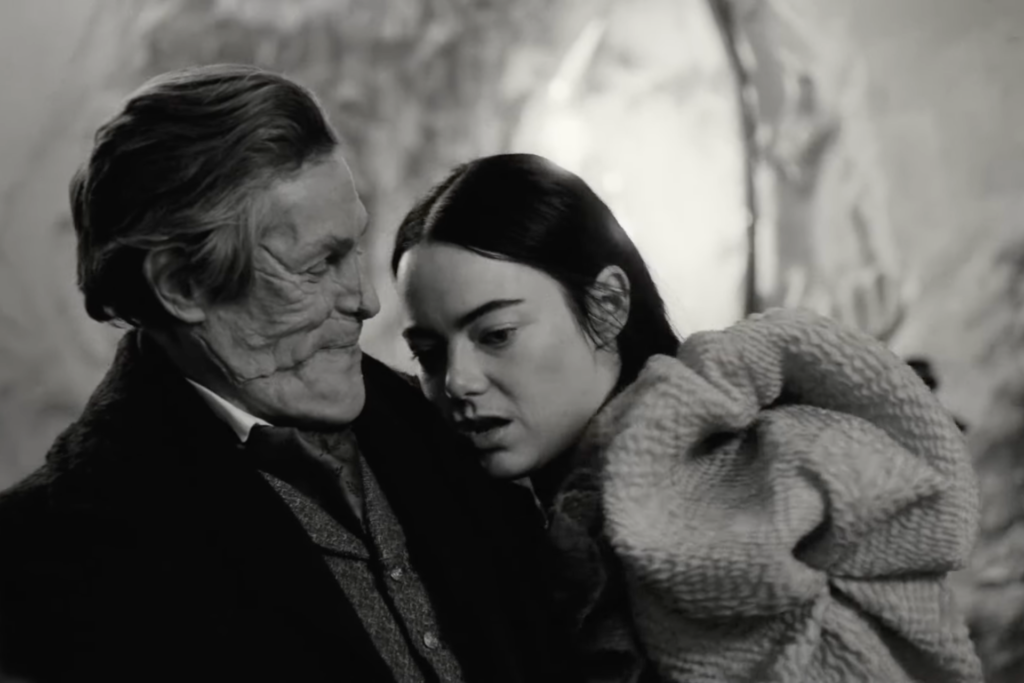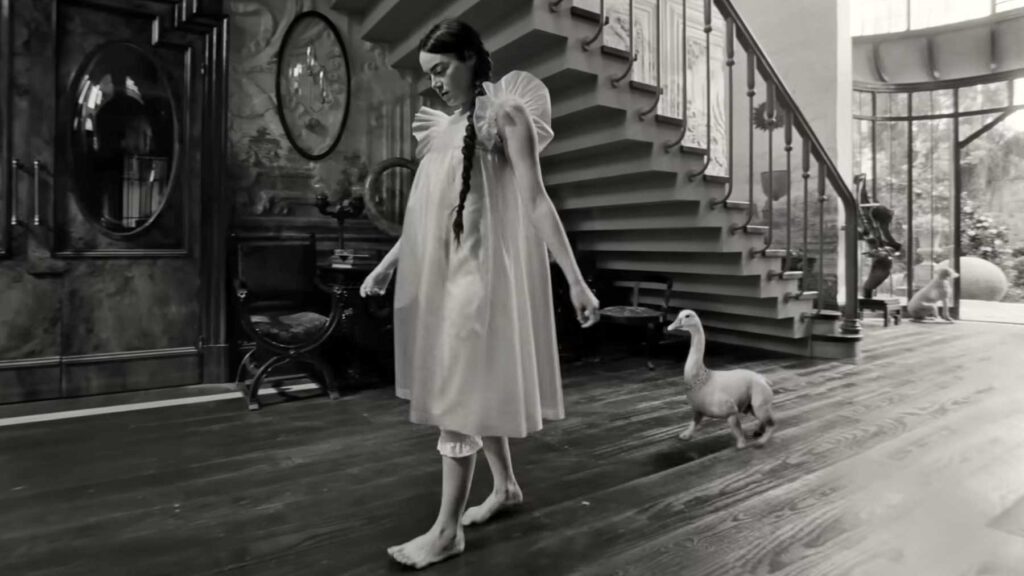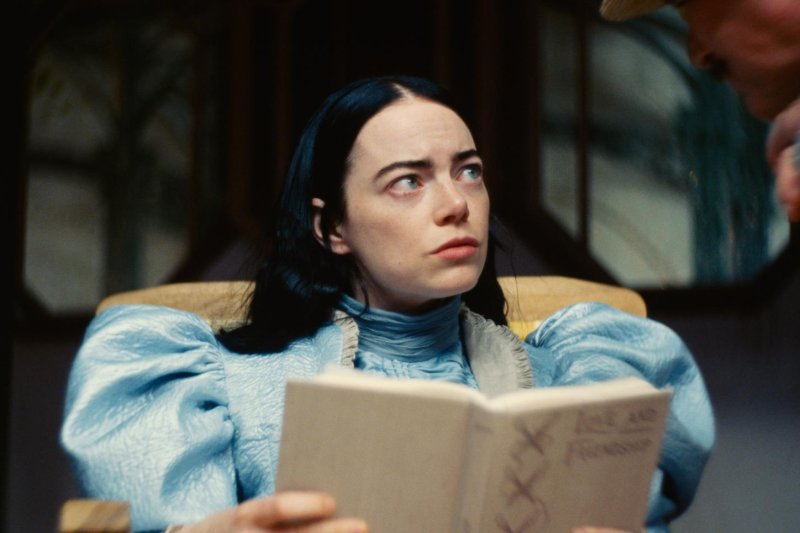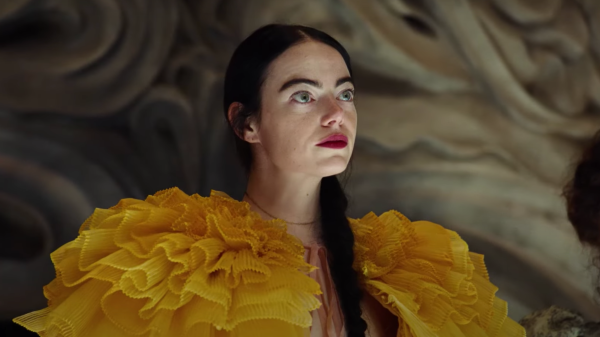Yorgos Lanthimos starts where most other film-makers have already left off. He is not afraid to take unconventional ideas and package them in such an original way that they develop a life of their own – as if a foreign body suddenly begins to mould itself into something new. Anyone who has not yet seen a film by Greek Weird Wave director Yorgos Lanthimos should do so before Poor Things, because Lanthimos’ film style is controversial and blunt. His characters often speak in a dry tone of voice, their tragedies are meant to be ironically funny, and he often shoots with a fish-eye camera. Thus, in “Poor Things”, not only is the title character Bella Baxter brought to life, but the viewer is also taken on an odyssey that defines everyone’s humanity. This film is far more than a Frankenstein story or at worst a soft porn – Bella Baxter is the spitting image of every woman; things that define us and that we want to achieve – we want to be reduced to more than our bodies or the child that lies dormant within ourselves – but is there really a world out there to enjoy?


Emma Stone plays Bella Baxter, a reanimated Frankenstein’s monster creation brought back from the dead by her guardian, Dr Godwin Baxter (Willem Dafoe). Bella is a young woman who tried to take her own life by throwing herself off Tower Bridge in London. Baxter retrieves her near-dead body from the muddy banks of the Thames under cover of darkness and reanimates her using methods whose exotic gruesomeness causes uproar. In Mary Shelley’s Frankenstein novel, a creature is resurrected from various body parts stolen from graves and presented more or less as a newborn infant in an adult monster’s body. Poor Things goes one step further and has the brain come from a literal infant.
In the first part of the film, Bella is an outsider who spends her days tapping atonally on a piano with her hands and feet, living for the moment her God walks through the door and breaking down when he says goodbye. Godwin Baxter feels obliged to protect this naive creature who began as a purely scientific experiment but has become a surrogate child. He chooses one of his students, Max McCandles (Ramy Yousssef), to observe and record Bella’s development. Day by day she learns more words; she finds out how her limbs work.
And she also discovers feelings that she has never had before. One afternoon, she grabs an apple from the table and impetuously begins to pleasure herself. This is great for her, but in Victorian terms, her blossoming sexual desire actually means the creation of a monster. It’s important to realise that Bella matures faster than other people. Initially the film is almost all black and white, but as the main character emancipates, it becomes fully colourful. She has to start from scratch with everything – how to walk, how to talk, how to find her way in the world. The character does not start having sex as a child – in terms of science, anything is possible and does not correspond to a development according to the norm. An absurd thought – if you question – why someone who mentally carries such a young age with them – sexualises and even, as becomes apparent later in the film, prostitutes themselves – but let’s be honest: “Poor Things” may be set in a Victorian streampunk version of Europe, but at its core, every woman’s body is a target – no matter how old she is.


To see an Oscar winner like Stone take on such a role and probably the most daring, if already celebrated, role of her career may seem unreal at first glance. After all, we’re talking about Gwen Stacey from “The Amazing Spider-Man” or have her role as Olive Pendergast from “Easy A” in mind, as a sometimes well-behaved or not-so-innocent teenager and now a whole decade later Stone is showing us – well, everything. And there’s a reason behind it: It’s her collaborator himself, where she can completely grab the covers. In her last collaboration, “The Favourite”, we already saw the actress leave her comfort zone.
During filming, Stone decided to take her role to the extreme by taking off her clothes. As it was her own decision, Stone found her first nude scene very encouraging. And “Poor Things” will have been no different. In the hands of the right director, you can venture into new territory and show a wonderment that no one else can tease out of you. And in “Poor Things”, Lanthimos and Stone show that not only does their collaboration have the potential to become legendary, but Bella Baxter’s chess moves make her one of the most complex female characters of the year. Not only does Lanthimos question “Why is there no sex in films?” and answer it himself with a lot of sex on screen, but also on reflection one wonders: why are we so prudish and used to what conforms to the norm?


Humanity and freedom include all areas, including sexuality. A film that shies away from this would betray the main character and everything that makes them who they are – it reflects the childlike nature of not feeling shame. What is missing in the experience of sex and the different desires that people have that we need to portray in order to adequately represent human desire and its idiosyncrasies? People are liberal with any violence and allow minors to experience it in any form, but with sexuality and especially female desire and lust, which is often repressed by the patriarchy, films that enlighten are suddenly declared a problem. Bella shows no shame about her body and doesn’t question who she is, she simply discovers and experiences and that is something to be wished for all of us.
At her core, Bella is exactly that – what the men around her want her to be – they want to gain her favor and she is there to satisfy a man’s needs – in the sense that the real enemy is always the patriarchy in the end. As in Greta Gerwig’s “Barbie” from this year, the focus here is on a female character who is controlled by others, but is exposed to the “real world” and begins to become independent. Both characters are characterised by their total openness and total naivety at the same time – they strive for a thirst for justice and want to find out who they really are. And so Lanthimos also challenges society and its rules that make the normal seem abnormal, he plays with the question of morality and explores the biggest question of all – who am I and why was I made? Bella Baxter is an emancipated woman. Every man she meets wants to possess or dominate her, but in the end it is Bella who triumphs.
Films that divide opinion are not only a source of entertainment, but also a powerful tool for social and cultural exploration. They stimulate dialogue, encourage critical thinking and reflect the intricate web of human society. To engage with controversial films is to embrace the diversity of thought and perspective that is essential for societal growth. As we navigate the complexities of an ever-changing world, these films serve as a mirror that reflects our collective values and inspires us to evolve into empathetic, open-minded and understanding global citizens.


At its core, “Poor Things” is far more than just a macabre Frankenstein story with black humour: it is a coming-of-age story. It’s an awakening – as Bella discovers the wonders and horrors of the world, we discover them too. Lanthimos forces us to reflect when she bumps up against the laws of social behaviour. It is our capacity for introspection, for moral reasoning and for shaping our own destiny through conscious choices that characterises us as beings capable of profound existential reflection. Bella Baxter is all of these things. At her core, she is like each and every one of us – only she speaks what the world means to her. And we should all take an example from such courage, especially when we are wronged.

